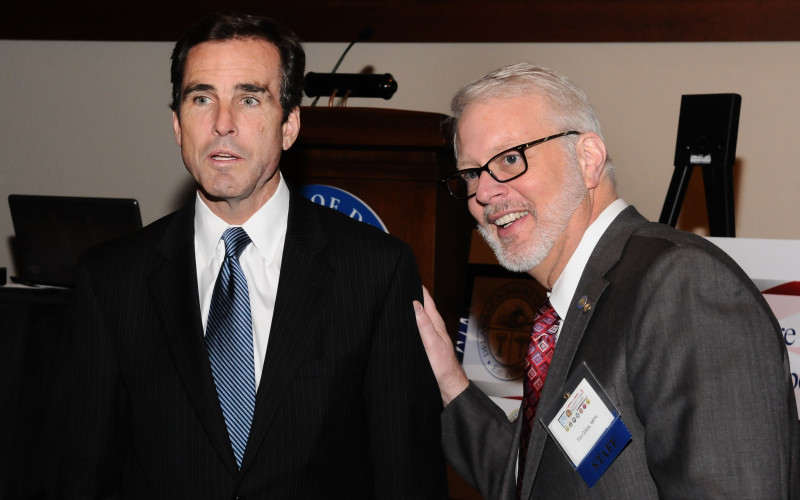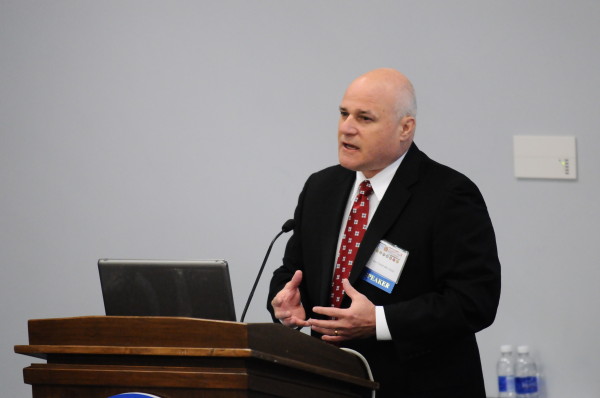Symposium highlights influence of battle injuries on advances in surgery and medicine

The inaugural Delaware Military Medicine Symposium, led by the Delaware Academy of Medicine in collaboration with the Delaware Chapter of the American College of Surgeons, in April highlighted the medical advances gleaned from the last 13 centuries of war.
The conference, organized to honor the Delawareans who served in the military, also focused on tailoring medical care to fit the state’s 78,016 veterans and the 50,237 Delawareans currently on active duty or in the reserves.
“The most violent activity humans participate in does advance our understanding of injury and how to care for it,” said Glen H. Tinkoff, M.D., associate vice chair of surgery at Christiana Care.
ABC reporter Bob Woodruff, critically injured by a roadside bomb while embedded with troops in Iraq in 2006, was the keynote speaker at the April 26 conference. He said he would not have survived the blast without the military’s rapid transport and innovative treatments that were not yet available in civilian hospitals.
“Warfare advances medicine, especially surgery,” said Dr. Tinkoff, who served as a visiting professor at Landstuhl Regional Medical Center in Germany, the largest American military hospital outside the U.S.
“You can draw lines and show the rapid advances that have coincided with conflicts,” said Kathleen W. McNicholas, M.D., FACS, JC, LLM, medical director of Performance Improvement at Christiana Care and immediate past president of the Academy. Civilian trauma care was far ahead of military care in 2001, before the conflicts, Dr. Tinkoff said. He said Level 1 trauma centers such as Christiana Care have always served as training grounds for military surgeons.
“Many things we do today in a surgical practice probably started in an army field hospital,” said John Swanson, M.D., chief of the Christiana Care Health System Kidney Transplant Program.
The list of advances rooted in the current conflict is long: burn treatments, transfusions techniques, artificial lungs, hypothermia treatments, resuscitation fluids, rapid patient transfer, renal replacement therapy, limb-saving techniques, advances in vascular surgery, new gauzes and bandages, treatment of traumatic brain injury – even an exoskeleton to help paralyzed patients stand.
“We have a lot of people coming back, people who are our neighbors and maybe in your practice,” said Dr. Swanson, M.D., a retired Army colonel. “You have to look at them differently because they’ve been through a lot, emotionally as well as physically.”
Dr. Swanson said medical professionals should make themselves aware of the resources highlighted in the program that are available to veterans and active duty personnel through local reserve and National Guard military units and the V.A.
He hopes medical professionals consider patients’ military history to determine how it may affect their present health: “Make sure you know what your patient could have experienced – post traumatic stress and unrecognized mild traumatic brain injury can be playing a role in his or her symptoms. He or she could have
been exposed to something in the combat zone that could explain present symptoms. Military history is a very
important part of their medical history.”

“The symposium gave us a greater understanding of the trials and tribulations of those who served,”
Dr. Tinkoff said. “These are unique individuals who have mustered the courage to go into harm’s way for the rest of us, so we can live in freedom.”
Tailoring treatment to fit those who served is especially important with the burgeoning need for medical care for veterans. “We’re finding out, unfortunately, with the situation with the V.A., that there are not enough people to care for the veterans,” Dr. Swanson said. “We’re going to have to use civilian
resources to expand that care.”
Attendees found the military approach instructional, even in non-technical areas. Several mentioned Lt. Col. David Sparks’ presentation on helping families enter the grieving process. Sparks worked as a chaplain at Dover Air Force Base, where the bodies of all U.S. military casualties are processed.
“It was heart-wrenching to sit there and try to understand how they do it day in and day out. “Every soldier who dies in combat in Iraq and Afghanistan comes through Dover,” Dr. Tinkoff said. “We also deal with grief at CCHS in our ICU’s and trauma center. Any exposure to another professional’s approach is helpful.”
The first Delaware Military Medicine Symposium will not be the last, according to Timothy E. Gibbs, MPH, executive director of the Delaware Academy of Medicine. “The symposium was a great success. We absolutely will be doing it again next year. “It was, from our standpoint, and that of the attendees, a home run.”